We all are witness to how online businesses are thriving through the pandemic. According to Maneferra, in its E-commerce statistics report, stated that the global e-commerce industry is expected to surpass USD 6.5 trillion during 2023.
Now, as we speak the pandemic has catalyzed this growth with consumers switching to online shopping by about 3-5 years. We also have to understand that building online stores has now become as easy as pie, simply by choosing from a multitude of available e-commerce solutions. Thanks to the user-friendly interfaces from most e-commerce platforms, setting-up online stores has now become the trend amongst young entrepreneurs and small businesses, with little knowledge of IT or coding required. Some platforms come with in-built CMS capabilities and hosting, making things further less complicated for beginners.
Besides, it costs way less, or even nothing at all, to use a pre-made platform than to build a brand new website from scratch, particularly for small businesses that are just starting. Let us understand the pros and cons of the top 5 e-commerce platforms in the market today.
1. Choosing an e-commerce platform
There is a misconception that e-commerce platforms are just meant for listing products and to facilitate online payments. That said, an actual e-commerce platform can do much more, such as serving as a central system giving retailers the control over managing all the business end-2-end, including stock control, tracking customers, marketing, and carrying out secure payments.
There are several quick-to-use e-commerce platform options available in the market, and for many retailers, it’s an easy yes for opening up online stores. Jump-starting without proper analysis, however, could be dangerous for your business growth.

Then how do we know which one to choose? Like everything else, each e-commerce platform has its strengths and grey areas. Based on your requirements you have to choose the one that suits you. It comes down to several factors including:

- The business needs, in terms of frontend visualization, business roadmap & plans, backend capabilities and integrations, architecture preference, responsiveness, and other additional features on the mobile interface.
- Budget, as costs are incurred for purchasing the platform, design & development, hosting & maintenance, and online transactions fees
- Research findings, as aspiring online retailers weigh the strengths and limitations between the possible options.
Bottom line, looking for an option with low operational costs and effective management tools is the easiest way to go!
2. 5 of the top e-commerce platforms: Pros & Cons
For many, there is nothing more exciting than starting an e-commerce business or switching up to an online store. Smart and savvy entrepreneurs would look for an ecosystem of tools for seamless integrations, giving them the command and the ability to scale up as the business grows.
Let’s take a look at the features of five popular e-commerce platforms that are in no particular order, and evaluate which might suit your business model.
2.1. Shopify
Shopify probably is the world’s extremely popular stand-alone e-commerce platform. It’s a perfect choice for beginners with no coding background and businesses with smaller budgets, with less of a compromise on quality and security features. A lot can be done in a matter of a few clicks with detailed guidance, to serve a range of users from beginners to advanced, and backed by 24 hours customer service. Shopify comes with an excellent responsive design and 150+ template options to choose from, customize, or even build a whole new one through the Liquid template engine.
On the other hand, Shopify only has 20 templates for free and they don’t come with a lot of features. Choosing the advanced options can cost up to $299 per month. Merchants have to plug into other apps for adding more functionalities. Despite the platform’s claim of optimized performance, users might still experience issues with speed, something beyond their control.
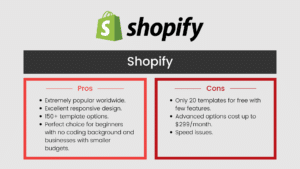
2.2. Magento Commerce
Released in 2008, Magento is one of the top e-commerce platforms that is preferred by a large number of companies of all sizes, including big names like Samsung, Nike, etc. Magento has earned its popularity thanks to it being very flexible and scalable. It’s an open-source platform where users are free to customize their services and products according to the size of their businesses. For those who are not tech-savvy, Magento is easy to operate as well as to analyze the performance of the service.
However, while the community version is free, the cost of the enterprise version is rather high. So if you are to operate a big business, it will cost you more than $15,000 approximately, and around $50,000 a year for the premium enterprise version. Also, the tech support service of Magento is not so responsive, despite having a large community of users.
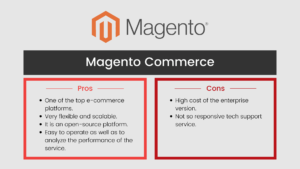
2.3. Yo!Kart
With Yo!Kart, things get interesting, because, unlike others in this list, it offers purpose-built solutions that can let you launch a multi-seller eCommerce marketplace like Amazon straight out of the box. There are dedicated, exclusive solutions for B2C and B2B marketplaces, like Amazon and Alibaba respectively.
Yo!Kart solutions have gained global traction owing to key features built in that allow entrepreneurs to get started with a holistic platform that offers customers a logic-driven and smooth buying journey, sellers with functionalities to sell and build their brand online, and marketplace Admin to manage eCommerce operations with ease.
Furthermore, the solutions also come with multiple business APIs and popular payment gateways pre-integrated. This allows marketplace owners to streamline operations like shipping, tax management, and other operations with ease.
Yo!Kart solutions are self-hosted, and can be used for a lifetime by purchasing a license for use. This license is part of bundled packages, available in one-time payment solutions. Additionally, they also offer source code ownership, up to 1-year free tech support and more.
On the flip side though, Yo!Kart ecommerce marketplace software comes with limited theme support out of the box.
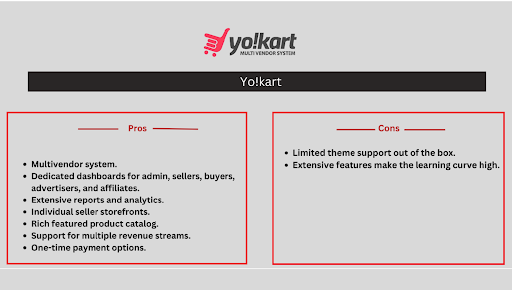
2.4. Drupal Commerce
Drupal Commerce is another well-known open-source platform that has been powering millions of websites globally. Users can integrate any software into the platform with no licensing fees. If you want professional support from Drupal, you can purchase one of the Commerce Guy plans, which start at $3,000 for an initial setup, and continue at a $580 per month fee. However, if you’re experienced in coding, it is totally possible for you to effectively develop the website yourself and save some money using the free version. Drupal is also known for its security and stability because it follows a strict coding standard and has a dedicated security team. Besides, the Drupal community of over 45,000 developers is so supportive that businesses can turn to software development, consulting, or any help needed at any time.
That said, the advanced interface and complex system of Drupal Commerce is quite challenging for newbies or junior developers to learn. Another disadvantage is that the platform doesn’t offer many high-quality designs in the free version, so users would have to go with self-developed designs if needed.
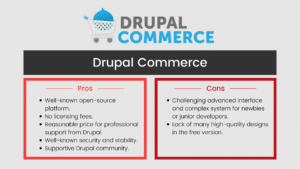
2.5. WooCommerce
WooCommerce is an open-source platform that gets you great control of your online business if implemented correctly. Themeforest claims that 30% of the world’s online stores are run on WooCommerce. It boasts all the latest features for all business sizes and offers a great deal of customization and plugins to make the online shopping experience more enticing and powerful. This platform comes in handy for selling digital subscriptions and downloadable products as well and has its official storefront. It’s highly scalable and fully loaded with pre-designed themes across both free and paid versions, enabling users to create professional-looking stores effortlessly. Users and customers have separate accesses, with a guest checkout option.
The popular WooCommerce often gets targeted by scammers, however, the platform allows a security plug-in that periodically scans the site for malware. Despite several themes, there are inconsistencies in terms of the required skills to edit them. One biggest setback is that WooCommerce can’t be used for websites that are not being hosted by WordPress. The initial setup could be challenging for real beginners. Also, it lacks a centralized support system, unlike many other platforms. Although it’s free to download and install, it comes with associated costs for hosting and extensions and the premium themes can cost around $150.

2.6. BigCommerce
Just like its name, BigCommerce is one of the biggest players when it comes to e-commerce solutions. Founded in 2009 in Australia, it is a NASDAQ-listed platform with a range of wholesome features. BigCommerce is highly suitable for growing businesses that need scaling. The platform allows you to add unlimited product variants and options easily and flexibly. Another feature that made the name of BigCommerce is its SEO capabilities, which helps online stores to quickly drive organic traffic and optimize the visibility of their products.
As BigCommerce is eager to go big, with pricing plans ranging from $29.95 to $299.95 per month, each of its plans comes with an annual sales threshold. That means if the yearly sales limit of your store is exceeded, the platform will upgrade automatically to the next bigger plan, which might cost you more than expected. The next drawback is that BigCommerce doesn’t have a built-in multi-language feature, so users can only do it via code, and this might require hiring a pro developer, which equals more cost.
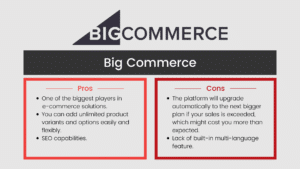
3. Conclusion
As the saying goes, every choice you make makes you! The same applies when it comes to e-commerce website development. How you want the online store to look, depends on what platform you choose and how you implement it. So, making the right choices in terms of platforms and partners is imperative for retailers setting-up online stores.
Despite some detailed pros and cons of the popular platforms stated above, choosing the right platform for your website may just remain an unsettled affair. Nevertheless, it might have given you a rough idea of what the top platforms are capable of, and helped figure out what’s apt for you.

At Kyanon Digital, our e-commerce pros have advised several clients globally on be-fitting e-commerce solutions for their businesses. We don’t just build, rather we take time to analyze your needs, understand where your business is heading, and guide you on making a comfortable decision, weighing the most suitable options. Eventually, we deliver high-performance e-commerce websites that your customers love to browse.
Got questions for our e-commerce experts? Ask us now!


